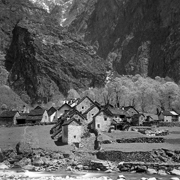
Val Bavona
The International Carlo Scarpa Prize for Gardens
XVII Annual Award, 2006
The jury of the International Carlo Scarpa Prize for Gardens has decided to award the 2006 Prize to Val Bavona, a short, rugged valley high in the mountains of Canton Ticino, Switzerland, an “awesomely beautiful” place, gouged by the glacier, shaped by water and stone, in which a community (about a thousand people) has come to terms with the power and harshness of nature and over time has developed the ideas, the attitudes, the actions and the artefacts of human life when pushed to its limits. The shape and life of the valley comprise a single geographical and historical entity, the component parts of which are visible with extraordinary clarity.
The glacier: one senses its presence from the U-shaped cross-section of the valley; and in fact it is still there up on Mount Basòdino (3,272 metres) and on the other mountains which have resisted climate change and the ravages of time.
Water: these glaciers give rise to the narrow, 124-square-kilometre basin of the valley, 80% of which is over 1,400 metres above sea level, and to the steep course of the river, which plunges 900 metres in the space of ten kilometres before joining the River Maggia, which itself flows into Lake Maggiore at 197 metres asl, some twenty kilometres further on. The river bed is now dry but the noise and force of the water, whose tumultuous white spray once gave the river its name (Bavone), are still felt through the Foroglio Falls, the only survivor of the great hydroelectric projects of the mid-XX century. Along the former course of the river the signs, symbols and tools of a sober and dignified material culture, at once “rough and refined”, remain a constant presence. We can imagine the violence of the river in flood and the accompanying sense of danger conveyed by the accounts of many direct witnesses. We can understand how the memory of the river can be so abiding, how its absence continues to be unbearable and how the sudden silence that followed the diversion of its waters must still constitute an aching void in the soul of the community. And climbing to Robiei, where the pastures of the alpe have been flooded to make way for a hydroelectric reservoir, we can experience, through the turbines and tunnels within the mountain, one of the contemporary world’s new forms of water.
Text taken from the 2006 Carlo Scarpa Prize Statement, edited by the Jury.
